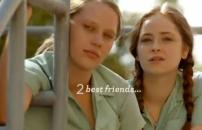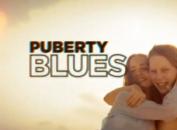AustLit
 8809197883385840416.jpg
8809197883385840416.jpg
Latest Issues
AbstractHistoryArchive Description
'Puberty Blues is an Australian classic which chronicles a special moment of our history. In the early 1970s, the middle baby boomers were coming into their adolescence and early adulthood. The sexual revolution was in full flow. In America "teenagerdom" had come into its own in the sixties. It happened here in the seventies, with the arrival of drugs and the anti-Vietnam fed youth rebellion. And the wild mood finds its apotheosis in surf culture. Puberty Blues is a picture of Australian suburban life in revolution as the wild kids get their rocks off, exploring the worlds of the parents in a context where money and loans are much cheaper, divorce is much easier, full employment and prosperity abound, conventional morality is shifting and everything is endlessly possible.'
Source: Australian Television Information Archive. (Sighted: 20/8/2013)
Includes
-
1.05form y
 Puberty Blues [Series One, Episode Five]
Australia
:
Southern Star Entertainment
,
2012
6346853
2012
single work
film/TV
Puberty Blues [Series One, Episode Five]
Australia
:
Southern Star Entertainment
,
2012
6346853
2012
single work
film/TV
'After a fight with her mum, Cheryl decamps to Debbie's house for a while and proves an unwelcome guest to everyone, except young David. He's falling in love. Gary and Debbie are growing closer, too, but his father Ferris is distraught when his affair folds. Debbie is unaware of the growing strain in her parents' relationship, but Gary is acutely aware of his. Meanwhile, the girls are getting bored waiting on the beach, watching the boys surf.'
Source: Australian Television Information Archive. (Sighted: 20/8/2013)
Australia : Southern Star Entertainment , 2012 -
2.03form y
 Puberty Blues [Series Two, Episode Three]
Australia
:
Southern Star John Edwards
,
2014
7625431
2014
single work
film/TV
Puberty Blues [Series Two, Episode Three]
Australia
:
Southern Star John Edwards
,
2014
7625431
2014
single work
film/TV
'Yvonne is torn between two lovers when Gary's father returns. Cheryl turns to Judy for help, with surprising consequences.'
Source: Australian Television Information Archive. (Sighted: 23/7/2014)
Australia : Southern Star John Edwards , 2014
Publication Details of Only Known VersionEarliest 2 Known Versions of
Works about this Work
-
Full Focus
2016
single work
column
— Appears in: The Saturday Paper , 4 June 2016; 'Director Emma Freeman's filmography includes some of Australia’s best-loved TV dramas, but her greatest challenge came at a much earlier age.' -
Puberty Blues - Then and Now: Diffracting Semblances of Being Girl in Australia
2016
single work
criticism
— Appears in: Feminist Media Studies , 06 October vol. 17 no. 3 2016; (p. 489-504)This paper attempts a diffractive analysis that reads Bruce Beresford’s Australian populist film Puberty Blues (1981) through the more recent (2012) Channel 10 eight-part series television of the same title. The purpose of this experimental analysis is to notice ways both of these filmic artefacts re/enact gendered semblances performatively, co- creating binary gender relations through Baradian intra-actions with a virtual audience (in the perpetual present). This paper is not a historical account of the texts and/or a review of the substantial literature connected to either text or television/film production in Australia. It attempts to conduct a non-representational analysis as a reading through of the texts with each other. What is significant is the process of examining “how different differences get made, what gets excluded, and how those exclusions matter” (Karen Barad 2007, 30) during inter-action with filmic text and viewer. This manoeuvre posits that by re/turning events as iterative interactions visibility of materiality in the making may be rendered visible. By understanding intra-active processes educators may be able to frustrate delimiting accounts of girlhood as just the way it is and rather utilise these texts to open up other imaginaries of affirmative difference.
Source: Abstract
-
Retrovisioning Chicko Roles : Puberty Blues as Postfeminist Television Adaptation and the Feminization of the 1970s
2016
single work
criticism
— Appears in: Continuum , vol. 30 no. 3 2016; (p. 326-335)"A recurrent theme in the studies of postfeminist adaptations of popular second wave feminist texts is the diminution at best, or gutting, at worst, of feminist politics in the contemporary remakes. This essay explores whether a similar process occurs in the 2012–2013 television adaptation of the Australian proto-feminist classic, Puberty Blues or whether a more productive relationship between feminism and postfeminism can occur. The television adaptation of Puberty Blues is an ideal text with which to examine Australian postfeminist adaptation, given that its source text is one of the earliest examples of Australian popular feminism, and a rare example of a text associated with Australian second wave feminism being remade. In contrast to many postfeminist adaptations in which feminism is contained, I demonstrate that Puberty Blues expands its popular feminist gaze from surf culture to Australian culture more broadly. Its careful retrovisioning – in both senses of looking back and using retro style – of the Australian 1970s feminizes a crucial era of the nation, and hence criticises a number of semi- dormant Australian cultural mythologies. As a result, it offers a fictional history lesson on the necessity of the Australian women’s movement. And it thus, disturbs postfeminist times with its comforting assumption that women’s inequality has been (smoothly) resolved and women are therefore fully integrated into the nation."
Source: Abstract
-
Ashleigh's Cummings Into Her Own Stride
2015
single work
column
— Appears in: The Sunday Mail , 31 May 2015; (p. 6) -
Star Role Makes Cornish Nasty
2014
single work
review
— Appears in: The Courier-Mail , 2 April 2014; (p. 33)
— Review of Puberty Blues 2012 series - publisher film/TV
-
Behind the Teens
2012
single work
review
— Appears in: The Sydney Morning Herald , 13 August 2012; (p. 5)
— Review of Puberty Blues 2012 series - publisher film/TV -
Gossip Girls
2012
single work
review
— Appears in: Sunday Canberra Times , 12 August 2012; (p. 27)
— Review of Puberty Blues 2012 series - publisher film/TV ; Underbelly : Badness 2012 series - publisher film/TV -
Back to the 70s
2012
single work
review
— Appears in: The Weekend Australian , 11-12 August 2012; (p. 20-27)
— Review of Puberty Blues 2012 series - publisher film/TV -
That's Just So Mature, Dad
2012
single work
review
— Appears in: The Courier-Mail , 11 - 12 August 2012; (p. 16)
— Review of Puberty Blues 2012 series - publisher film/TV -
Sexual Freedoms and Social Liberties Abound
2012
single work
review
— Appears in: The Australian , 15 August 2012; (p. 17)
— Review of Puberty Blues 2012 series - publisher film/TV -
Back to the Future in 2012
2011
single work
column
— Appears in: The Courier-Mail , 16 December 2011; (p. 64) -
Sand, Surf and Sex Return for TV Series
2012
single work
column
— Appears in: The Sun-Herald , 1 January 2012; (p. 13) -
Show True Puberty Blues, Not Whitewash
2012
single work
column
— Appears in: The Sydney Morning Herald , 18 January 2012; (p. 13) -
Talking About Sex is Fine - Abortion is the Dirty Word
2012
single work
column
— Appears in: The Age , 18 January 2012; (p. 13) -
Dramatic Look at Ugly Australia of the '50s
2012
single work
column
— Appears in: The Courier-Mail , 9 July 2012; (p. 10)
Awards
- 2014 nominated Australian Academy of Cinema and Television Arts Awards — Best Television Drama Series Nominated for series two.
- 2013 nominated Logie Awards — Most Outstanding Drama Series
- 2013 nominated Logie Awards — Most Popular Drama Program
- 2013 winner Australian Academy of Cinema and Television Arts Awards — Best Television Drama Series
- Sydney Southern Suburbs, Sydney, New South Wales,
- Cronulla, Caringbah - Cronulla area, Sutherland area, Sydney Southern Suburbs, Sydney, New South Wales,
- 1970s



